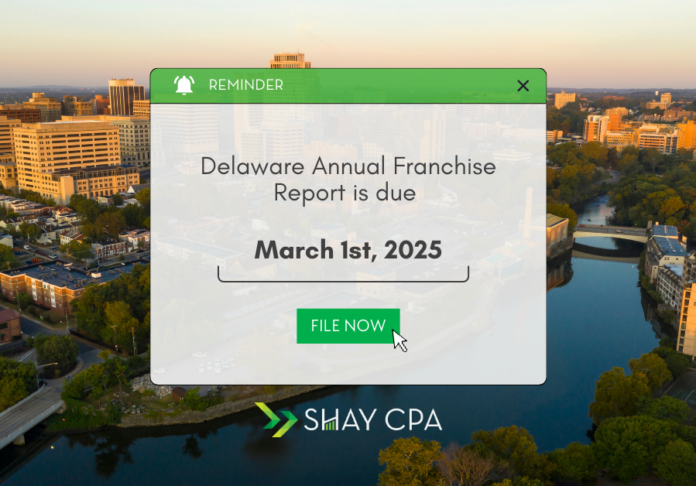Every corporation incorporated in Delaware must file an Annual Franchise Tax Report and pay franchise taxes. This requirement applies regardless of the company’s activity level or income. Paying this tax ensures the corporation maintains good standing in the state.
Key Dates and Deadlines for Startups
The Delaware Annual Franchise Tax Report is due by March 1st each year. Startups should mark this date on their calendars to avoid last-minute stress and penalties. Planning ahead and consulting a tax advisor well before the deadline can prevent issues.
Filing Process
Startups can file the Delaware Annual Franchise Tax Report online through the Delaware Division of Corporations’ website. They will need their file number, found in their articles of incorporation or through a quick search on the Division’s site. The report requires details from the company’s balance sheet as of December 31st of the prior year and an updated cap table. If you need guidance, feel free to reach out to us.
Responsibility for Filing and Payment
The corporation is responsible for filing the Annual Franchise Tax Report and making the required payment. This task usually falls to officers, directors, or a tax advisor managing the filing.
Tax Amounts
The franchise tax amount depends on the calculation method chosen:
- Authorized Share Method
- Assumed Par Value Capital Method
Delaware provides an online calculator to estimate the tax using both methods. We’ve also attached a spreadsheet calculator to help estimate your total tax liability.
Factors affecting the tax amount include the number of authorized shares and the company’s gross assets. The minimum tax is:
- $175 for corporations using the Authorized Shares Method
- $400 for corporations using the Assumed Par Value Capital Method
The maximum tax is $200,000 unless classified as a Large Corporate Filer, in which case it increases to $250,000.
Penalties for Non-Compliance
Failing to file the report and pay taxes by March 1st results in a $200 penalty plus 1.5% monthly interest on the unpaid balance. Continued non-compliance can cause a company to lose its good standing in Delaware, leading to potential legal and financial issues.
Impact on VC-Backed Startups
Venture Capital (VC)-backed startups, especially in tech, face unique challenges with the Delaware Annual Franchise Tax. These companies often have complex cap tables due to multiple financing rounds, different share classes, and stock options. This complexity can significantly impact tax calculations, particularly under the Assumed Par Value Capital Method, which factors in gross assets and issued shares.
As startups raise capital and issue more shares, their franchise tax liability may fluctuate each year. Accurate cap table management and strategic tax planning are essential to handle these changes effectively. Given these complexities, VC-backed startups benefit from working with tax advisors specializing in high-growth companies. These experts can help optimize tax liabilities and explore strategies to minimize franchise tax payments while staying compliant.
Another key consideration is the Authorized Share Method, which bases the tax solely on the number of authorized shares in a company’s charter. Many startups authorize a high number of shares to accommodate future growth and investment rounds. However, this approach can lead to substantial tax bills. Startups should carefully evaluate how share authorization and capital structure impact their franchise tax obligations.
To manage these challenges, startups should:
- Review and update cap tables regularly to ensure accuracy.
- Consult tax professionals to select the best tax calculation method.
- Plan for franchise tax expenses in financial models, especially when fundraising.
To Recap
For VC-backed startups, the Delaware Annual Franchise Tax isn’t just a compliance requirement—it’s a financial planning opportunity. By understanding how tax calculations interact with their capital structures, startups can better manage liabilities and maintain compliance.
The Delaware Annual Filing is due on March 1st. You can file directly here unless using your registered agent’s site.
Our firm specializes in helping VC-backed startups navigate these complexities. Whether you need filing assistance or tax optimization strategies, we’re here to help—just contact us!

